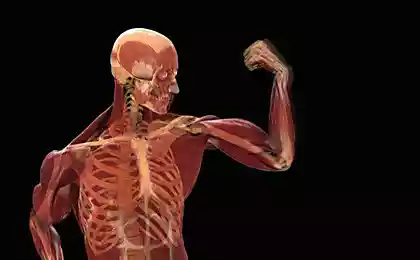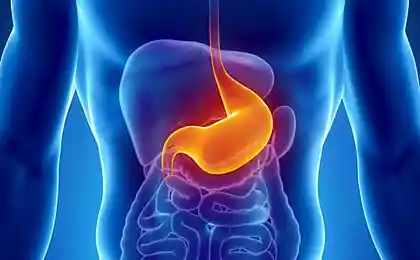451
20 facts about digestion

We offer you a selection of interesting facts about digestion.
1. Your digestive tract is a 9-meter tube that begins in the mouth and ends at the anus.
2. In the small intestine so the folds down to the microscopic, the total area of its surface is 250 square meters. This is enough to cover a tennis court.
3. Digestion begins even before you have something to eat. The sight and smell of food triggers the production of saliva and digestive juices. Once the first piece gets into your mouth, all the digestive system begin to work actively.
4. The Roman physician Galen believed stomach animate being within us, which is "capable of feeling the emptiness that encourages us to look for food».
5. We need about 72 hours to digest the gala dinner. The first digested carbohydrates, such as various cakes and pastries. Then will come the turn of dry overcooked protein (fried chicken), and will take the longest fats, including sauces and whipped cream with the cake.
6. The man eats an average of about 500 kg of food per year.
7. The mouth has a neutralizing function. He either cools or heats the food to a temperature that is acceptable to the rest of the digestive tract.
8. Every day we produce about 1, 7 liters of saliva. Saliva regulated autonomic nervous system, which means that the process takes place automatically. That's why we have saliva is produced with only one form, smell or thought of food.
9. The muscles of the digestive organs are reduced wave motion a process called peristalsis. Precisely because of this food into the stomach of man, even if he is, standing on his head.
10. have a huge capacity of the stomach. The average adult stomach can withstand about 1 liter of food.
11. In order to digest the food also needs calories, that is 5 to 15 percent of our energy consumption. Most energy required for digestion of proteins.
12. Pikatsizm or pica - a violation of the Food, in which a person develops the need to have non-edible items such as paint, chalk and dirt. It manifests itself in 30 percent of children, and the reason it is not known. There are suggestions that the whole blame lack of some minerals.
13. The main digestive juice - hydrochloric acid, which can dissolve the metal, but plastic toys, pencils and hair out at the other end of the digestive tract virtually unchanged.
14. What happens if you swallow chewing gum? There is a myth that gum stays in your stomach 7 years, before it is digested. It is not true. Our body does not digest gum, but it will come together with a chair relatively unchanged. In very rare cases, a large number of chewing gum and constipation can lead to blockage in the intestine.
15. Most of the hormone serotonin - the main hormone mood - is performed not in the head and in the stomach.
16. If pancreatitis your body begins literally devour you from the inside. Pain that occurs at the same time, due to the fact that enzymes digest fat seep out of the pancreatic duct to other tissues, which actually eats away at you.
17. The water, enzymes, basic salts, mucus and bile create about 7, 5 liters of fluid that gets us into the colon. Only about 6 tablespoons of the mixture comes out of all this.
18. The liver is the laboratory of our body. It performs over 500 different functions, including the storage of nutrients, filtering and processing of chemicals in food, the production of bile, and many others.
19. The loudest burp, which was recorded, was 107, 1 dB, which can be compared with the volume of a chainsaw. Its owner was the Briton Paul Hann who has demonstrated his abilities on television.
20. Flatulence or intestinal gas is swallowed air mixture, the gas produced by the reaction in the stomach and gas produced by bacteria in the digestive tract. This mixture consists of nitrogen, oxygen, carbon dioxide, hydrogen and methane.
via factroom.ru
9 most enduring scientific theories that were wrong
10 most popular theories to explain the enigma of the Bermuda Triangle























